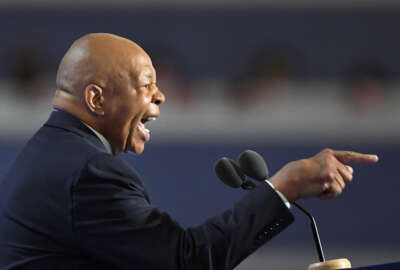

Three prominent Republican lawmakers wrote to White House General Counsel Donald McGahn, asking that the Trump administration clear up any confusion that new agency...
In light of recent reports that some agencies have received new communications directives, three Republican lawmakers are urging the White House to consider how those policies may impact federal employees and their perceptions of their own whistleblower rights.
Communication from some agencies has been confusing, said House Oversight and Government Reform Committee Chairman Jason Chaffetz (R-Utah) and Government Operations Subcommittee Chairman Mark Meadows (R-N.C.), in addition to Senate Judiciary Committee Chairman Chuck Grassley (R-Iowa), in a Feb. 1 letter to White House General Counsel Donald McGahn.
“The White House is in a position to alleviate any potential confusion for federal employees regarding whether these recent memoranda implicate whistleblower protection laws,” lawmakers wrote. “As the new administration seeks to better understand what problems exist in this area, this is an appropriate time to remind employees about the value of protected disclosures to Congress and inspectors general in accordance with whistleblower protection laws.”
Clarifying this language may also help incoming employees unfamiliar with these civil service protection laws better understand them, they added.
Their letter comes a week after House Oversight and Government Reform Committee Ranking Member Elijah Cummings (D-Md.) wrote to McGahn, urging the administration to rescind any agency communications policies that don’t comply with whistleblower protection law.
Cummings argued that these orders violate the Whistleblower Protection Enhancement Act (WPEA), because they do not include a mandatory statement explaining that federal employees’ communications with inspectors general or members of Congress are protected.
His latest concern concern is a Jan. 20 memo from the acting Health and Human Services Department secretary, which advised employees to halt correspondence to public officials that contained policy statements unless asked to do so.
Chaffetz, Grassley and Meadows didn’t go as far as Cummings, and in fact, questioned whether these agency policies and memos in fact violated the law. But they did acknowledge “significant confusion surrounding these communications.”
Rep. Gerry Connolly (D-Va.), the ranking member of the government operations subcommittee, pushed this issue during a government operations hearing on whistleblowers Wednesday.
Tom Devine, legal director for the Government Accountability Project, said the HHS memo violated three provisions in WPEA, along with two appropriations riders, the Llyod-LaFollette Act and the First Amendment.
Other witnesses agreed.
“I”m very familiar with the provision in the WPEA that requires that appropriate language be put in place in any policy or agreement that would attempt to deter communications by whistleblowers, communications with Congress,” said Robert Storch, deputy inspector general and whistleblower ombudsman for the Justice Department, when Connolly pressed him on these agency memos. “The law seems quite clear in requiring that, and anything that doesn’t do that that falls within those parameters would be in violation with the WPEA.”
But even if agencies re-issue these communications memos with the WPEA language, the damage is done and they’ve already “created a chilling effect,” said Elizabeth Hempowicz, policy counsel for the Project on Government Oversight.
But good government groups, and now lawmakers, say the White House needs to actively demonstrate its commitment to whistleblowers.
“Everybody shares the goal of cutting waste, fraud and abuse in our government, but in order to do that, you have to encourage whistleblowers to come forward,” Eric Bachman, deputy special counsel for litigation and legal affairs at the Office of Special Counsel, said. “They’re the ones who know about that waste, fraud and abuse. Tone at the top really matters in these situations. That’s what going to encourage and give employees that comfort that if they come forward, they’re not going to be retaliated against.”
Meadows said during Wednesday’s hearing that the letter was an attempt to encourage the White House to use whistleblowers “as an ally” for identifying waste, fraud and abuse.
“Protecting whistleblowers who courageously speak out is not a partisan issue — it is critical to the functioning of our government,” Chaffetz, Grassley and Meadows wrote.
Connolly said he planned to write his own letter to agency leaders asking about the steps they’re taking to ensure that organizational communications comply with whistleblower law.
This comes as Congress begins to examine how it might revise WPEA, which lawmakers passed nearly five years ago.
Some provisions in the law require congressional authorization in order for them to continue, such as the requirement that all IGs have a specific whistleblower ombudsman.
“It should have a dual purpose, first being a shield to protect those who have seen the wrongdoings or the corruption and to allow them the opportunities, and quite frankly, the incentives to report them,” Rep. Dennis Ross (R-Fla.) said of WPEA. “And then it should be a sword as well. It should be … able to go in and cut off the wrongdoing and enforce what needs to be done. It seems … that the sword has been turned back, and it’s been turned back on the whistleblower.”
Copyright © 2025 Federal News Network. All rights reserved. This website is not intended for users located within the European Economic Area.
Nicole Ogrysko is a reporter for Federal News Network focusing on the federal workforce and federal pay and benefits.
Follow @nogryskoWFED


